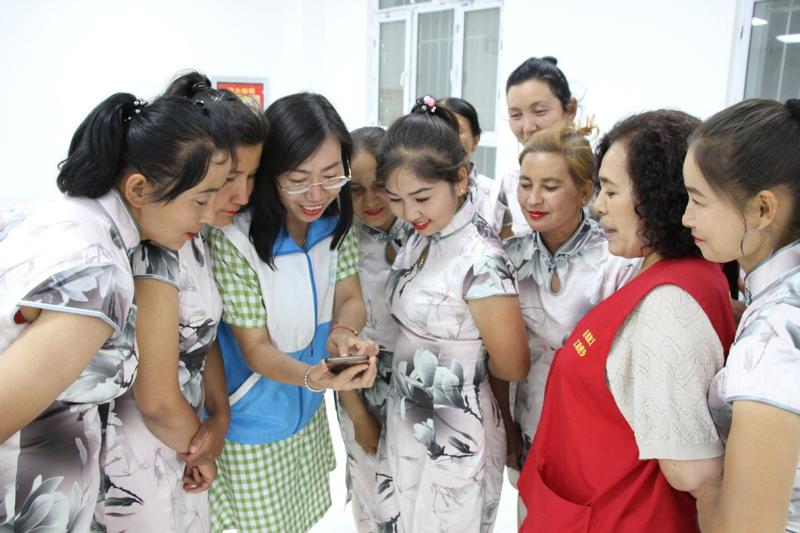 Community service workers from Karamay, Xinjiang Uygur autonomous region, organize performance clubs to keep villagers entertained. (PHOTO / CHINA DAILY)
Community service workers from Karamay, Xinjiang Uygur autonomous region, organize performance clubs to keep villagers entertained. (PHOTO / CHINA DAILY)
Staff members from a community service center in Karamay in the northern part of the Xinjiang Uygur autonomous region have helped improve the lives of impoverished families in 11 villages in southern Xinjiang since 2018.
By the end of last year, the center, Tianshan Xinjiayuan, had dispatched 10 community service workers to Aksu prefecture's Awat county and Hotan prefecture's Moyu county where they stayed for over 300 days to devote themselves to incubating local community service bodies, setting up volunteer rescue teams, improving villagers' Mandarin skills, promoting healthy living habits and organizing performance clubs for locals to entertain themselves. Funds totaling 588,300 yuan (US$89,800) and over 2 metric tons of vegetables were also distributed to villagers in need.
By the end of last year, the center, Tianshan Xinjiayuan, had dispatched 10 community service workers to Aksu prefecture's Awat county and Hotan prefecture's Moyu county where they stayed for over 300 days to devote themselves to incubating local community service bodies, setting up volunteer rescue teams, improving villagers' Mandarin skills, promoting healthy living habits and organizing performance clubs for locals to entertain themselves
ALSO READ: Xinjiang's achievements impress visiting envoys
Three community service workers began living in rural areas in Awat in July 2018 to help conduct poverty-alleviation work.
"We rented the house of a villager as our dormitory. Although the rooms were infested with fleas and mice that we city dwellers were very scared of, we still managed to overcome the difficulties," said Yan Li, 44, founder and director of the Karamay-based community service center.
She added that she was glad to have played a role in the country's poverty-alleviation effort. "That will be a memorable period in my life," Yan said.
Yan and her co-workers have taken steps to inject new blood into local community service bodies. Several college graduates have been recruited and have become qualified community service workers after training in the field. Gulmira Turgun, 20, is one of them.
She once suffered from excessive nervousness when speaking in front of a crowd. With patient instruction from Yan and her co-workers on how to carry out community services for villagers, Gulmira gradually equipped herself with the requisite knowledge and social skills and became an active community service worker.
In Awat's Komerik village, all the residents are members of the Uygur ethnic group and only speak Uygur in their daily conversations. After two months of door-to-door investigations in the village, the community service workers found that most of the children in the village had difficulties in their studies because of their poor Mandarin. The workers then started after-class tutorials for the 70 children in the village to help with their homework and spark their interest in learning.
In December 2019, they also applied to set up a service center in Awat county to provide support and care for children in rural areas, helping them develop in an all-around way.
READ MORE: Xinjiang women see more opportunities
The community service workers also noticed that local women, who were not well-educated, often engaged in heavy farmwork during the busy season but had difficulties finding work during the slack season. To increase their incomes, the community service workers invited craftspeople to hold a workshop to teach the women how to knit shoes, teacup mats and other handicrafts for sale.
Tursunay Mamatemin, who once survived on a basic living allowance, said she learned knitting skills from the workshop.
On the first day she tried to sell the handicrafts in the market, she earned 110 yuan.
"I never expected selling such handicrafts could be more lucrative than selling walnuts," she said.
In 2019, she decided to start her own business by selling the handicrafts after learning how to knit and weave items that sold well in the market.
"I don't want to rely on the support from the government," Tursunay said. "I'll try to be an independent woman."


